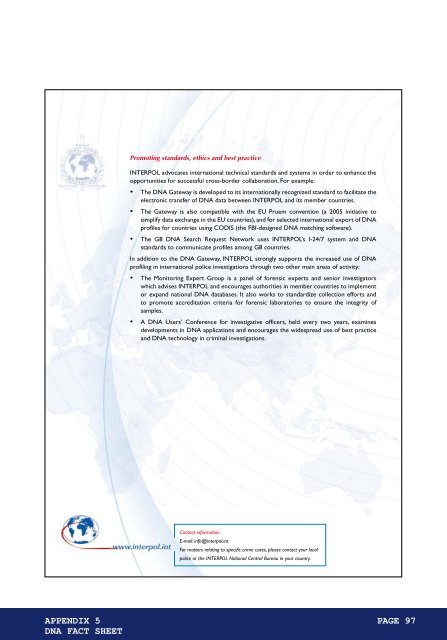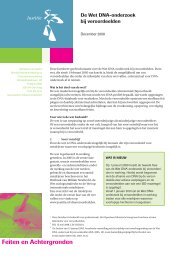INTERPOL HANDBOOK ON DNA DATA EXCHANGE AND PRACTICE
INTERPOL HANDBOOK ON DNA DATA EXCHANGE AND PRACTICE
INTERPOL HANDBOOK ON DNA DATA EXCHANGE AND PRACTICE
You also want an ePaper? Increase the reach of your titles
YUMPU automatically turns print PDFs into web optimized ePapers that Google loves.
Promoting standards, ethics and best practice<strong>INTERPOL</strong> advocates international technical standards and systems in order to enhance theopportunities for successful cross-border collaboration. For example:• The <strong>DNA</strong> Gateway is developed to its internationally recognized standard to facilitate theelectronic transfer of <strong>DNA</strong> data between <strong>INTERPOL</strong> and its member countries.• The Gateway is also compatible with the EU Pruem convention (a 2005 initiative tosimplify data exchange in the EU countries), and for selected international export of <strong>DNA</strong>profiles for countries using CODIS (the FBI-designed <strong>DNA</strong> matching software).• The G8 <strong>DNA</strong> Search Request Network uses <strong>INTERPOL</strong>’s I-24/7 system and <strong>DNA</strong>standards to communicate profiles among G8 countries.In addition to the <strong>DNA</strong> Gateway, <strong>INTERPOL</strong> strongly supports the increased use of <strong>DNA</strong>profiling in international police investigations through two other main areas of activity:• The Monitoring Expert Group is a panel of forensic experts and senior investigatorswhich advises <strong>INTERPOL</strong> and encourages authorities in member countries to implementor expand national <strong>DNA</strong> databases. It also works to standardize collection efforts andto promote accreditation criteria for forensic laboratories to ensure the integrity ofsamples.• A <strong>DNA</strong> Users’ Conference for investigative officers, held every two years, examinesdevelopments in <strong>DNA</strong> applications and encourages the widespread use of best practiceand <strong>DNA</strong> technology in criminal investigations.Contact informationE-mail: info@interpol.intFor matters relating to specific crime cases, please contact your localpolice or the <strong>INTERPOL</strong> National Central Bureau in your country.APPENDIX 5dna fact sheetPAGE 97







